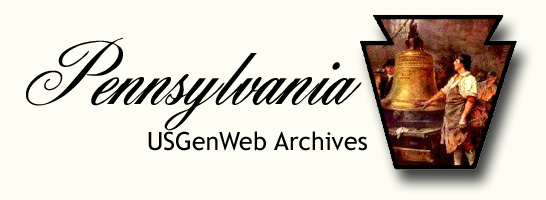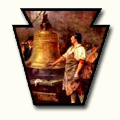| |
A History of Pittsburg and Western Pennsylvania Troops in the War
By John V. Hanlon (Copyright 1919 by The Pittsburg Press)
Chapter XVIII
(The Pittsburg Press, Sunday, May 18, 1919, page 76)
Names in this chapter: Pollock, Bundy, Weaver, Walcamp, Reese, McGovern,
Peters, Phillips, Hedrick, Cronkhite
THE EIGHTIETH DIVISION

The diary of Corp. Nelan Pollock, of Wilkinsburg, which
appeared in THE PRESS of Sunday, April 20, in connection with this history of
the Pennsylvania troops in the war, revealed the activities of the Eightieth
division up to and including Oct. 15, 1918, and only the first phase of the
Argonne Meuse offensive was set forth. The troops of the Eightieth had been
relieved at the front and sent back to Cuisy to rest. They had successfully
captured Bethancourt, Montfaucon, crossed the Meuse and at the time relieved
were pursuing the rapidly retreating Hun to the northward. The Eightieth was not
through with fighting, however. They fought many important engagements before
the armistice was signed. In this instalment [sic] the diary of Corp. Pollock is
again taken up where it was left off on Oct. 15, and vividly portrays the final
battles of the Eightieth and the soldier life after the armistice was signed.
“After resting four days at Cuisy, the Three Hundred
and Twentieth and Three Hundred and Nineteenth infantries went back into the
front lines, this time on the Metz sector, to relieve the One Hundred and
Fifty-ninth brigade of our own division. The enemy had just rushed up four fresh
divisions from Metz, and in this encounter the Pennsylvanians were put to their
first real test. Many airplanes dashed down from the clouds turning their
machine guns on us, and giving the enemy artillery our range. Whizz-bangs,
mustard gas shells, and shrapnel tore the earth around us, while hundreds of
machine guns poured a deadly fire into our troops. Yet the Pittsburg brigade
kept on and on, gaining yard after yard, until we wrested almost four kilometers
from the enemy despite the fact we were outnumbered four to one. Our brigade was
later relieved by the Fifth division but I regret to say not all of our boys
went back into the rest camp. Beneath the moss, grass and forest ruins of the
Argonne lay many of Pittsburg’s best and bravest sons.

“After resting for two weeks in reserve quarters, the
Eightieth division with the Marines corps at its side attacked the German lines
on Nov. 1 at St. George, and in company with its worthy companions captured the
town, and went on to Ommecourt, Buzancy, and several other small towns which
fell after the severest of fighting. Many wooden crosses in this sector today
tell the story of the men who gained the victories. A wounded Marine at
Fleuville on Nov. 3, spoke these words to me, ‘God bless the boys of the One
Hundred and Sixtieth brigade who fought with us today. America never produced
better.’ A general order issued while the battles from the 1st of November until
the 5th were in progress, and signed by Maj. Gen. Cronkhite commended the One
Hundred and Sixtieth brigade and stated that it had borne the brunt of the
burden. Maj. Gen. Cronkhite was in command of the division and he further said
that the brigade during the five days of continuous fighting had advanced a
total distance of 153 kilometers and captured two Huns for every man wounded,
one camion for every 10 wounded, besides large quantities of munitions and other
stores and accomplished these results with a far less percentage of casualties
than any other division. on.”
“Our last push is over it seems. I am writing this by
candle light on Nov. 12, the day following the signing of the armistice. There
was general rejoicing at the signing of the armistice but most of the boys
wanted to go on. From the dope we have now we will never have to go up front
again. I was in it all right to the finish and I wouldn’t trade my experience
for any others in the world.

“No doubt the papers have been telling you about our
last push. It was more like a ‘run’ and quite a success. I have been getting
copies of THE PRESS they have been sending and when I came out of the trenches
the last time, I got the box from Horne’s. I am feeling fine and getting plenty
to eat. How’s this for a breakfast on the battlefield – pancakes, syrup, rice,
bread and cocoa, chewing gum and cigarets? Sometimes we have doughnuts. We
haven’t had the flu here but some of the men had it before they arrived here. It
seems great to have bonfires and candle lights, lights on autos and trucks, and
funnier still to have everything so quiet and no planes overhead. From THE PRESS
clippings you have sent me, I judge the papers must be getting the right dope
about our fighting. Pittsburg people must not be ashamed of her soldiers over
here. They have made a good [unreadable] we went over the top [unreadable] call
us the last time when we couldn’t [unreadable] with the enemy in motor trucks.
“We have lots to be thankful for at Thanksgiving day.
Just two months [?] spent the worst and most awful times of my whole life. How
thankful I am that those days and nights are over for me and for everybody.
“Dec. 4 – I am writing this in an old French woman’s
kitchen. She keeps talking away to me all the time in broken English, but mostly
French and the interpreter informed me she was telling me to be sure and write
to my papa and mama, so I am doing that very thing. We are still at Nicey, south
of Paris and [unreadable]. We receive the Paris edition of New York papers here
[unreadable] and knew almost as soon as you did that the Fourth Liberty loan was
a success. We were glad to hear it, too, for we [unreadable] as the loan that
would bring us home.
“Dec. 20 – It looks very much as though we will spend
Christmas this year in Nicey, but I am hoping New Years’ will find us a little
closer to home. We spend the evenings here gathering around our table talking
over our experiences. This is a ‘Y’ and a canteen with services every Wednesday
p.m. and Sunday. The boys all thing President Wilson is the greatest man in the
world. A few days ago we were issued new clothing and we get a hot shower twice
a week, so that cooties have almost become a thing of the past.
“Dec. 26 – Christmas day has passed. It was unlike all
of my other Christmas days, but we all had a good time under the circumstances.
The cooks fairly outdid themselves for us, and the French women of the town lent
their efforts. They helped bake 65 pies for our company alone, In the afternoon
I have my first ride on a French passenger train. Soldiers do not have to pay.
The coaches look something like the Pittsburg summer street cars. Give me the
U.S.A.
“Dec. 29 – We have been here now almost a month and
indications are we will remain until we see how things come up on the Rhine.
There are rumors that we will get to sail for home soon, but we don’t put much
credence in them.”
Corp. Pollock’s story of the Three Hundred and
Twentieth infantry regiment ends here. The Three Hundred and Twentieth regiment
was never separated from the Eightieth division throughout the fighting and the
account therefore can be taken as an authentic one of this famous division’s
activities in the war.

|
|







